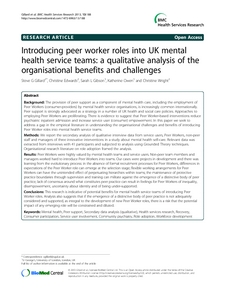Gillard, SG; Edwards, C; Gibson, SL; Owen, K; Wright, C
(2013)
Introducing peer worker roles into UK mental health service teams: a qualitative analysis of the organisational benefits and challenges.
BMC Health Services Research, 13 (188).
ISSN 1472-6963
https://doi.org/10.1186/1472-6963-13-188
SGUL Authors: Gillard, Steven George
![[img]](https://openaccess.sgul.ac.uk/101274/1.hassmallThumbnailVersion/1472-6963-13-188.pdf)  Preview |
|
["document_typename_application/pdf; charset=binary" not defined]
Published Version
Download (256kB)
| Preview
|
Abstract
BACKGROUND: The provision of peer support as a component of mental health care, including the employment of Peer Workers (consumer-providers) by mental health service organisations, is increasingly common internationally. Peer support is strongly advocated as a strategy in a number of UK health and social care policies. Approaches to employing Peer Workers are proliferating. There is evidence to suggest that Peer Worker-based interventions reduce psychiatric inpatient admission and increase service user (consumer) empowerment. In this paper we seek to address a gap in the empirical literature in understanding the organisational challenges and benefits of introducing Peer Worker roles into mental health service teams.
METHODS: We report the secondary analysis of qualitative interview data from service users, Peer Workers, non-peer staff and managers of three innovative interventions in a study about mental health self-care. Relevant data was extracted from interviews with 41 participants and subjected to analysis using Grounded Theory techniques. Organisational research literature on role adoption framed the analysis.
RESULTS: Peer Workers were highly valued by mental health teams and service users. Non-peer team members and managers worked hard to introduce Peer Workers into teams. Our cases were projects in development and there was learning from the evolutionary process: in the absence of formal recruitment processes for Peer Workers, differences in expectations of the Peer Worker role can emerge at the selection stage; flexible working arrangements for Peer Workers can have the unintended effect of perpetuating hierarchies within teams; the maintenance of protective practice boundaries through supervision and training can militate against the emergence of a distinctive body of peer practice; lack of consensus around what constitutes peer practice can result in feelings for Peer Workers of inequality, disempowerment, uncertainty about identity and of being under-supported.
CONCLUSIONS: This research is indicative of potential benefits for mental health service teams of introducing Peer Worker roles. Analysis also suggests that if the emergence of a distinctive body of peer practice is not adequately considered and supported, as integral to the development of new Peer Worker roles, there is a risk that the potential impact of any emerging role will be constrained and diluted.
| Item Type: |
Article
|
| Additional Information: |
PMCID: PMC3673834
© 2013 Gillard et al.; licensee BioMed Central Ltd. This is an Open Access article distributed under the terms of the Creative Commons Attribution License (http://creativecommons.org/licenses/by/2.0), which permits unrestricted use, distribution, and reproduction in any medium, provided the original work is properly cited. |
| Keywords: |
Mental health, Peer support, Secondary data analysis (qualitative), Health services research, Recovery, Consumer participation, Service user involvement, Community psychiatry, Role adoption, Workforce development |
| SGUL Research Institute / Research Centre: |
Academic Structure > Population Health Research Institute (INPH) |
| Journal or Publication Title: |
BMC Health Services Research |
| ISSN: |
1472-6963 |
| PubMed ID: |
23705767 |
| Web of Science ID: |
23705767 |
| Dates: |
| Date |
Event |
| 2013-05-24 |
Published |
|
  |
Download EPMC Full text (PDF)
|
 |
Download EPMC Full text (HTML)
|
 |
Go to PubMed abstract |
| URI: |
https://openaccess.sgul.ac.uk/id/eprint/101274 |
| Publisher's version: |
https://doi.org/10.1186/1472-6963-13-188 |
Statistics
Item downloaded times since 04 Jul 2013.
Actions (login required)
 |
Edit Item |




